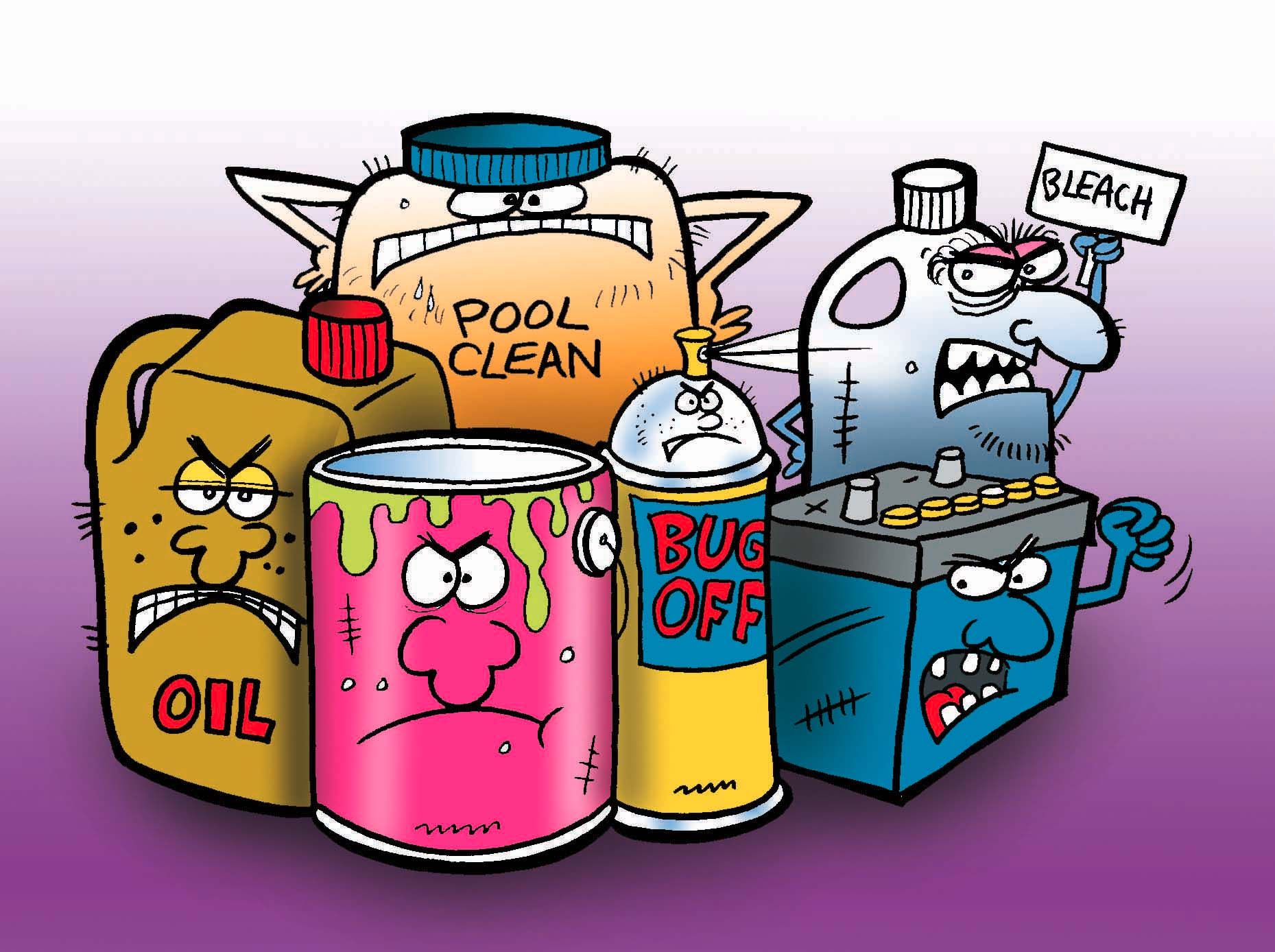You've heard that toxic chemicals are bad for you, but what exactly is a toxic chemical? Here's an explanation of what is meant by the term "toxic chemical" as well as examples of common toxic chemicals you may have in your home or encounter in the environment.
Toxic Chemical
The U.S. Environmental Protection Agency or EPA defines a toxic chemical as any substance which may be harmful to the environment or hazardous to your health if inhaled, ingested or absorbed through the skin.
Toxicity
Toxicity is the degree to which a chemical substance or a particular mixture of substances can damage an organism. Toxicity can refer to the effect on a whole organism, such as an animal, bacterium, or plant, as well as the effect on a substructure of the organism, such as a cell (cytotoxicity) or an organ such as the liver (hepatotoxicity). By extension, the word may be metaphorically used to describe toxic effects on larger and more complex groups, such as the family unit or society at large. Sometimes the word is more or less synonymous with poisoning in everyday usage.

A central concept of toxicology is that the effects of a toxicant are dose-dependent; even water can lead to water intoxication when taken in too high a dose, whereas for even a very toxic substance such as snake venom there is a dose below which there is no detectable toxic effect. Considering the limitations of this dose-response concept, a novel Drug Toxicity Index (DTI) has been proposed recently. DTI redefines drug toxicity, identifies hepatotoxic drugs, gives mechanistic insights, predicts clinical outcomes and has potential as a screening tool. Toxicity is species-specific, making cross-species analysis problematic. Newer paradigms and metrics are evolving to bypass animal testing, while maintaining the concept of toxicity endpoints.
Toxic Chemicals in Your Home
Many useful household projects contain toxic chemicals. Common examples include:
- Drain cleaner
- Laundry detergent
- Furniture polish
- Gasoline
- Pesticides
- Ammonia
- Toilet bowl cleaner
- Motor oil
- Rubbing alcohol
- Bleach
- Battery acid
While these chemicals may be useful and even necessary, it is important to remember they should be used and disposed of according to instructions on the packaging.

Natural Toxic Chemicals
Many toxic chemicals occur in nature. For example, plants produce toxic chemicals to protect themselves from pests. Animals produce toxins for protection and to capture prey. In other cases, toxic chemicals are simply a by-product of metabolism. Some natural elements and minerals are poisonous. Here are some examples of natural toxic chemicals:
- Mercury
- Snake venom
- Caffeine in coffee, tea, kola and cocoa
- Arsenic
- Ricin from castor beans
- Petroleum
- Hydrogen sulfide
- Chlorine gas
- Smoke
Industrial and Occupational Toxic Chemicals
The US Occupational Safety and Health Administration (OSHA) has identified several chemicals it considers highly hazardous and toxic. Some of these are laboratory reagents, while others are used commonly in certain industries and trades. Certain pure elements are included. Here are a few substances on the list (which is extremely long):
- Acetaldehyde
- Acetone
- Acrolein
- Bromine
- Chlorine
- Cyanogen
- Isopropyl alcohol
- l-limonene
- Hydrogen peroxide >35%
Are All Chemicals Toxic?
Labeling a chemical as "toxic" or "non-toxic" is misleading because any compound can be toxic, depending on the route of exposure and the dose. For example, even water is toxic if you drink enough of it. Toxicity depends on other factors besides dose and exposure, including species, age, and gender. For example, humans can eat chocolate, yet it's toxic to dogs. In a way, all chemicals are toxic. Similarly, there is a minimum dose for nearly all substances below which toxic effects are not seen, called the toxicity endpoint. A chemical can be both necessary for life and toxic. An example is iron. Humans need low doses of iron to make blood cells and perform other biochemical tasks, yet an overdose of iron is deadly. Oxygen is another example.
Types of Toxins
Toxins may be categorized into four groups. It's possible for a substance to belong to more than one group.
- Chemical Toxicants - Chemical toxins include both inorganic substances, such as mercury and carbon monoxide, and organic compounds, such as methyl alcohol.
- Biological Toxins - Many organisms secrete toxic compounds. Some sources consider pathogenic organisms to be toxins. A good example of a biological toxin is tetanus.
- Physical Toxicants - These are substances that interfere with biological processes. Examples include asbestos and silica.
- Radiation - Radiation has a toxic effect on many organisms. Examples include gamma radiation and microwaves.



